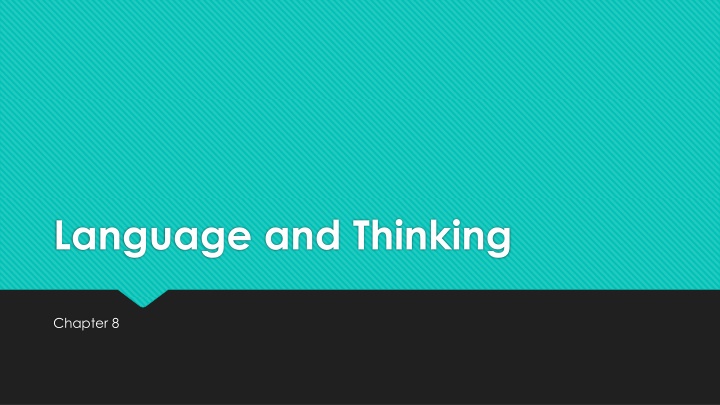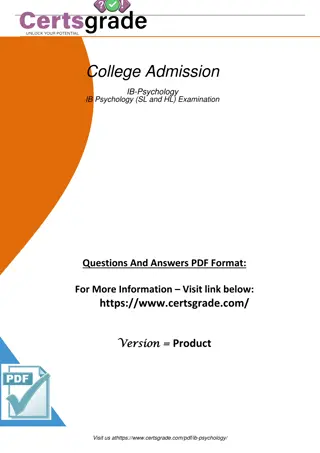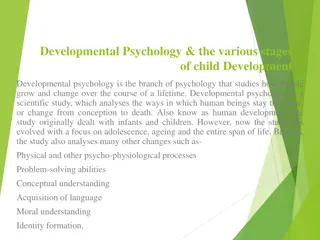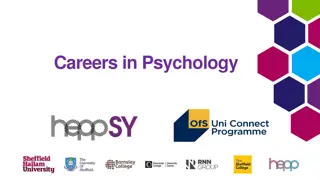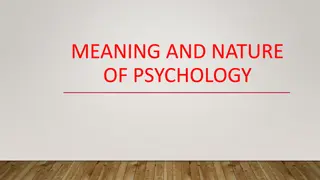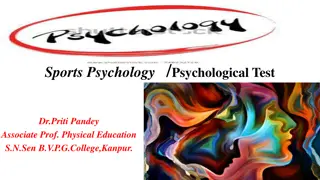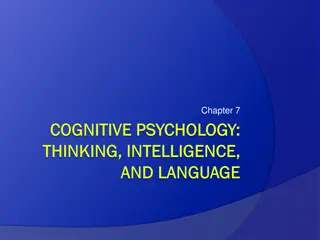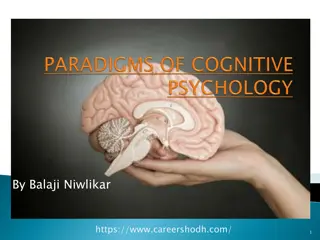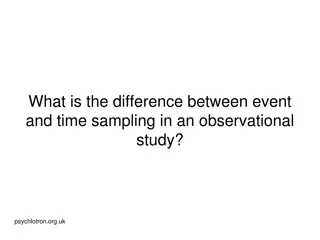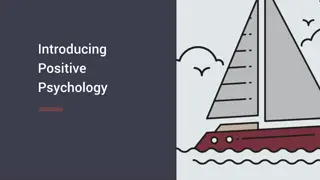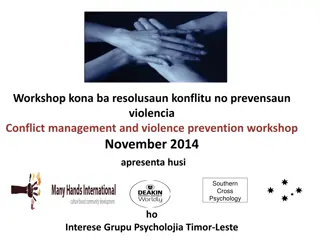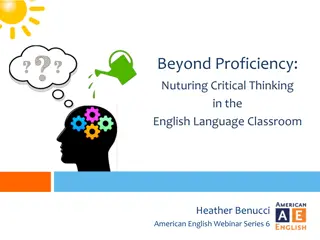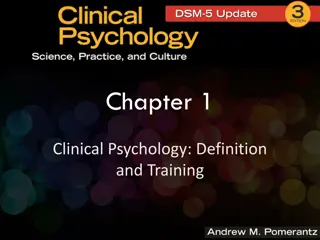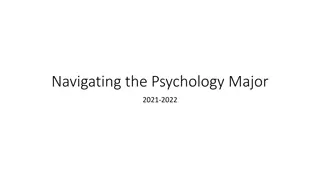Language, Decision-Making, and Consumer Psychology
Delve into the intricate relationship between language and decision-making, discover how advertising utilizes language to influence consumer behavior, and examine the impact of semantics and the framing effect on our perceptions. Understand the elements of language, such as phonemes, morphemes, and syntax, and uncover how language shapes our thoughts and reasoning processes. Explore the connection between language, reasoning, and everyday life interactions, gaining insights into the power of words and communication.
Download Presentation

Please find below an Image/Link to download the presentation.
The content on the website is provided AS IS for your information and personal use only. It may not be sold, licensed, or shared on other websites without obtaining consent from the author.If you encounter any issues during the download, it is possible that the publisher has removed the file from their server.
You are allowed to download the files provided on this website for personal or commercial use, subject to the condition that they are used lawfully. All files are the property of their respective owners.
The content on the website is provided AS IS for your information and personal use only. It may not be sold, licensed, or shared on other websites without obtaining consent from the author.
E N D
Presentation Transcript
Language and Thinking Chapter 8
Warm Up What is the connection between language and decision-making?
Homework: Advertising Poster Pretend that you are advertising a product On a small poster (paper size), show a visual advertisement (could be real or you could make it up) that uses words and pictures to demonstrate the methods, strategies, and decisions that Advertisers make to get people to buy their product Research different articles to help you Recall what the Guest Speaker had to say In 1-2 sentences, explain how these methods, strategies, and decisions made by advertisers impact the psychology of the consumer to get them to buy a product
Learning Objectives Interpret the connection between language and decision-making Analyze different elements of language and reasoning Build connections to your life
Elements of Language Phonemes: Basic sounds of a language Morphemes: Units of meaning in a language Syntax: The way in which the words are arranged to make phrases and sentences
Examples of Elements of Language A. Phonemes: -The way I pronounce coffee -Difference between the o sound in dog and no B. Morphemes: -Pre= before -Use of s at the end of words to emphasize that the word is plural C. Syntax -Subject>Verb>Dinner (Linda cooked dinner)
Semantics and The Framing Effect Semantics: The relationship between language and the things depicted in the language Example: Right and Write The Framing Effect: Refers to the way in which wording affects decision making
Check For Understanding -Do you think Semantics makes ideas expressed through language more or less clear? -Have you seen the Framing Effect being used? Where was it used? How did it impact people? -How could language impact someone s psychology?
Thank you for Smoking https://www.youtube.com/watch?v=FkbdbRjMX2Y How is he using Semantics? What role does it play in making his point? How is he using The Framing Effect? What role does it play in making his point How is he using language to impact people s decisions? Do you agree with him? How does he use language to try to persuade you?
Bilingual Households What are the Pros and Cons of growing up in a Bilingual or Monolingual Household a. What type of household did you grow up in? b. How has this impacted your understanding of language(s)? c. How has this impacted your ability to learn in school? d. How has this impacted your relationship with the world around you?
Article on Bilingualism 1. What are the five common misconceptions about growing up in Bilingual Household that this article mentions? 2. Why were immigrant parents originally made to drop their language of origin and adopt English? 3. How does the Nature vs. Nurture Controversy play a role in Bilingualism? 4. What would Albert Bandura say about what happens when people speak different languages around children 5. When is the best time to learn a language and when is it too late? 6. In 20 years from now, do you see Bilingualism as being important? Why or why not?
Warm Up Identify three myths about Bilingual Households and explain the truth about the myth
Homework: 1-2 Page Essay Think about a critical decision that you have to make in the next couple years: A. What is the process that you have to go through to make this decision? B. Decide what the Pros and Cons are of this decision and what information about the decision do you still need. C. What factors will play a role in you making this decision? D. What Biases/Beliefs will play a role in this decision? MAKE SURE TO INCLUDE CLEAR THESIS STATEMENT, Introduction, Body Paragraphs, and Conclusion
Learning Objectives Interpret the three Units of Thought Analyze methods and steps to solve problems Build Connections to your life
Decision Making and Judgement Reasoning: The use of information to reach conclusion Premise: Idea or statement that provides basic information that allows us to draw conclusions Deductive Reasoning: The conclusion is true if the premises are true Inductive Reasoning: We arrive at conclusions through individual cases or particular facts Confirmation Bias: Seeking to prove or confirm a hypothesis rather than disprove it Overconfidence: Only looking at what you want to look at to make a decision
Example of Deductive Reasoning San Francisco is in California A lot of Hippies live in San Francisco Therefore, a lot of Hippies live in California 1. What are the premises here? 2. What is the conclusion? 3. Is this a good way to come to a conclusion? Why or why not?
Example of Inductive Reasoning Spain and Portugal are near each other and have similar languages Sweden, Denmark, and Norway are near each other, and they all have similar languages Therefore, countries that are near each other have similar languages 1. What are the premises here? 2. What is the conclusion? 3. Is this a good way to come to a conclusion? Why or why not? 4. What is a better way to come to a conclusion? Deductive or Inductive Reasoning? Why do you think this?
Check for Understanding Which form of reasoning do you think is better to use when making decisions: Deductive or Inductive Reasoning? Why do you think this? Have you ever seen a Confirmation Bias used before? Why and how was it used? List three examples of Overconfidence in your own life
Brainstorming If I were to ask you to draw Biggie doing something, what kind of mental picture would be in your head? Explain what Biggie looks like in your mental picture in 2-3 sentences
Thinking Thinking: The mental activity that is involved in the understanding, processing, and communicating of information -Three units of thought Symbols: An object or act that stands for something else Concepts: Grouping of objects, events, or ideas that have similar characteristics Prototypes: Example of a concept which best exemplifies the concept
Check for Understanding How was Thinking involved in the mental picture that you had of Biggie in the Warm Up? How were you using the Units of Thought to create this mental picture? Which Unit of Thought do you think was most useful in helping you to create this mental picture? What connections can you draw between the different Units of Thought? Identify an example of each Unit of Thought that you have in your life
Student Problems: One Paragraph What is the connection between thinking and problem solving? In one paragraph, describe a recent problem that you faced and how you went about solving the problem. Then think about other ways in which you could have solved that problem
Algorithms and Heuristics Algorithms: Specific Procedure that leads to the solution of a problem when performed correctly Heuristics: Rules that often, but not always, help us find the solution of a problem
Applying the Material: Hangman How are Heuristics being used to figure out the word? What are other games/ways/times when you use Heuristics to solve problems? What is the difference between Heuristics and Algorithms?
Good Will Hunting https://www.youtube.com/watch?v=Ta3sClUQmfM https://www.youtube.com/watch?v=fNwVdc7Er8s How are Algorithms being used here? Do Algorithms only apply to Mathematics? Could they apply to other subjects? If so, what examples can you think of? Create an example of an Algorithm for any problem in your life
Problem Solving Methods Trial and Error: Try different things until you find one that works Difference Reduction: Identify the goal, where we are in relation to achieving the goal, and the direction we must go to move closer to it Means-End Analysis: Certain things we do will have certain results Working Backward: Identify the solution and figure out how to get to the solution Analogy: Similarity between two or more items, events, or situations
Check For Understanding Rank the problem solving methods from most important to least important in terms of how helpful they are Did you use any of these steps when you solved the problem that you wrote about? If so, which ones? If not, which ones would have been helpful for you to use?
Problem Solving Worksheet Answer the questions on the Problem Solving Worksheet and be sure to fill out what Problem Solving technique you used to solve this
Exit Ticket What are the three Units of Thought? What is the difference between a Heuristic and an Algorithm?
Warm Up Identify three of the Problem Solving techniques/methods that we discussed last class and give an example of how you have used them in your life
Homework: 1-2 Page Writing Assignment Think about the a critical decision that you have to make in the next couple years: A. What is the process that you have to go through to make this decision? B. Decide what the Pros and Cons are of this decision and what information about the decision do you still need. C. What factors will play a role in you making this decision? D. What Biases/Beliefs will play a role in this decision? MAKE SURE TO INCLUDE CLEAR THESIS STATEMENT, Introduction, Body Paragraphs, and Conclusion
Learning Objectives Interpret the role of Insight and Incubation Effect in Thinking Analyze different Problem Solving methods Build connections to your life
Insight and Incubation-Brainstorming When have you heard the word Insight ? What do you think it means? How does Insight connect to Problem Solving? What is an Incubator ? What do you think an Incubator Effect might mean?
Insight and Incubation Insight: Sudden Understanding Incubation Effect: Arriving at the solution to a problem when we have not been consciously working on the problem
Freedom Writers https://www.youtube.com/watch?v=jFNJib8MpT0 https://www.youtube.com/watch?v=AjGIJPE8B8I Do you think this is a better example of the Incubation Effect or Insight? What is being solved or understood here? What problem solving method do you think is most evident in these scenes?
Check for Understanding Write down an example of a time in your life when you gained insight Write down an example of a time in your life when the Incubation Effect happened to you
Cooperative Learning: Problem Solving Methods-15 minutes In Groups of 4-5, you will create some type of presentation to present to the class that demonstrates the use of a Problem Solving Methods to a common problem for teenagers Your group has the choice of creating a skit, writing a song, or making a visual poster to demonstrate the use of your Problem Solving Method Problem Solving Methods: Algorithms, Heuristics, Trial and Error, Difference Reduction, Means-End Analysis, Working Backward, Analogies Be sure to show how people gained Insight or engaged in the Incubation Effect from using the Problem Solving Method that your group had
Presentations-Remember Good Public Speaking Skills Engaging Voice Good Pacing-Not too fast, Not too slow Look at your audience Be aware of body posture Make sure you have practiced what you will be saying Stay relaxed
Senoi Problem Solving Solution Read the article about the Senoi people and how they solve problems in their society. Then answer the questions that follow
Discussion: Problem-Solving What do you think is the biggest problem in our society that we can solve? How can we solve this problem? What new problem solving solutions can we come up with?
Thinking and Problem Solving Review Sheet Fill out the Review sheet on Thinking, Language, and Problem Solving
Exit Ticket Which type of problem solving do you think is most relevant for your life? Why do you think this?
Warm Up What critical decision did you write about for homework? Identify three things that are going to help you make this decision
Looking Ahead Quiz III during Finals Weeks: Thinking, Language, Problem Solving, Intelligence
Learning Objectives Transition into Intelligence Analyze different forms of intelligence Build Connections to your life
The ABCDEs of Problem Solving A: Assess the problem B: Brainstorm approaches to the problem C: Choose the approach that seems most likely to work D: Do it- try the most likely approach E: Evaluate the results
Applying the ABCDEs to Problem Solving to a national/international problem What problem did you write about for homework Using this Problem Solving method, identify a problem that exists in or outside our country, and explain how you would go about solving the problem through each step Make sure you fully explain how you are applying each step in the ABCDEs to solve the problem
Transitioning: Intelligence What does it mean to be intelligent ? How do you determine someone s intelligence? Are there different types of intelligence? If so, what are they?
Intelligence Vocabulary Intelligence: The abilities to learn from experience, to think rationally, and deal effectively with the environment Achievement: Knowledge and skills gained from experience
Check For Understanding What is the main difference between intelligence and achievement? Do you think Socrates would have agreed with this definition of intelligence? Why do you think this? What problem solving method did Socrates create to become more intelligent? Do you think you could have achievement without intelligence? Do you think you could have intelligence without achievement?
